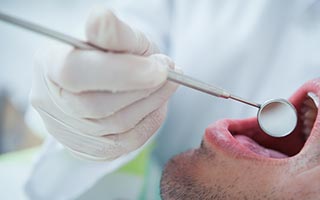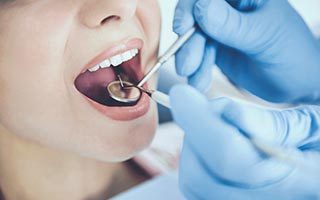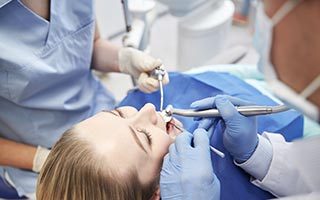DENTAL EXAMINATIONS & HYGIENE
COMPREHENSIVE EXAMINATIONS & HYGIENE
Comprehensive examinations and hygiene are the foundation of your oral health. Generally, your first appointment with us will involve taking thorough records and examination of your oral health with additional focus on any specifics you would like investigated. A hygiene appointment is usually also scheduled in during this first visit to both allow us to investigate your teeth and gums more thoroughly and to remove any plaque or calculus build up which if left will cause gum disease.
After the examination and records, the dentist will explain everything in exquisite detail and offer you advice as to what may be possible. We are here to offer you guidance, but believe you are ultimately in charge of deciding what path forward is best for you.
Educational Video
Frequently Asked Questions
- What is ‘plaque’ and how does it affect my teeth?
- My gums bleed when I brush or floss. Is this normal?
- How often should I have my teeth cleaned?
- How many times should I floss my teeth?
- How does bad breath occur?
- Oral health care and braces
- Canker sores
- What are the benefits of fluoride?
- What is topical fluoride?
- What is Dental Prophylaxis?
- What is Scaling And Root Planing?
- What is tooth decay (caries or cavities)?
- Who is at risk for tooth decay?
Plaque is a colourless, sticky film of bacteria that constantly forms on teeth. If left undisturbed, it hardens to form tartar. The bacteria in the plaque produce byproducts that can not only irritate the gums and make them bleed, but it can also lead to periodontal disease. A daily regimen of proper brushing, flossing and rinsing (plus, regular dental visits), will help you keep your teeth healthy.
Healthy tissue doesn’t bleed. This is most likely a sign of early gingivitis. If you experience bleeding gums, see your dental health professional to review proper brushing and flossing techniques. Schedule a soft tissue evaluation with your dentist that will include x-rays and prophylaxis cleaning. Gum bleeding must be taken seriously because if left untreated, it will lead to periodontal disease.
People accumulate plaque at different rates. Although most insurance plan coverage is for a twice a year schedule, it’s sensible to get your teeth professionally cleaned as often as your dental health professional advises you, even if it’s every 3 months.
At least once a day. There’s an old adage among dentists:Floss only the teeth you want to keep. If you don’t want to lose your teeth, floss every day. Otherwise, you’ll be 75% more susceptible to periodontal disease that has been documented to have serious health consequences, e.g. a higher likelihood of heart disease, diabetes, pneumonia and infections. About 45% of American adults have some form of gingivitis, and most adults over 60 have already lost their teeth. Don’t be one of them. Floss at least once a day.
Bad breath occurs when sulfur compounds are produced in the body and released into the air. The most common source of this sulfur is anaerobic (without oxygen) bacteria that live in the grooves or fibers at the back of the tongue. These bacteria produce the sulfur that gives off an unpleasant smell. This frequently occurs when the mouth is dry, creating an ideal environment for anaerobic bacteria to thrive. Sulfur compounds are also produced when certain types of food are consumed. The compounds make their way into the bloodstream and then to the lungs, where they are excreted into the air we exhale.
Bad breath is caused by many factors. Normally, saliva helps wash away the natural buildup of bacteria in the mouth and on the tongue. Yet, when saliva sits on the back of the tongue and is digested by bacteria, it shows up as a white film on the tongue. This is a major source of bad breath. Bad breath is also caused by postnasal drip, a condition where the back of the tongue and throat accumulate high amounts of protein, which bacteria thrive on. Foods that are high in protein or acidity, such as fish, milk, cheese or coffee, also cause bad breath. Dieting or fasting, both of which involve a low intake of calories, causes bad breath by reducing the saliva in the mouth. Contrary to popular belief, stomach problems do not cause bad breath.
More persistent problems with unpleasant breath can indicate diseases such as diabetes, liver dysfunction, pulmonary disease, and respiratory disease. Periodontal pockets, the spaces that form between the teeth and gums, are another source of bad breath. These pockets, which occur in the latter stage of periodontal disease, create spaces for bacteria to grow, and give off a chronic unpleasant odour. Dental work may be required in order to remove these pockets of bacteria. Periodontal disease is detected by the presence of bleeding gums, loose teeth, receding gums, or pain when chewing.
Prevention
Proper oral hygiene eliminates many cases of bad breath. Daily brushing and flossing removes the plaque and bacteria that often cause bad breath. While brushing, take special care to thoroughly brush the back of the tongue where bacteria normally collect. Mints and mouthwashes can hide bad breath, but do not eliminate this condition. Avoid foods that have powerful odours and drink lots of water to insure that the mouth is cleansed and full of oxygen (an environment in which bacteria do not thrive). For information on current treatments, contact a dentist in your area regarding current products on the market that can eliminate bad breath.
The following recommendations will help to eliminate, or reduce, any oral health problems while your teeth are in braces: Brush your teeth carefully after every meal with fluoride toothpaste and a soft-bristled toothbrush, as food becomes easily lodged in the braces. Floss daily between the teeth and the braces. Maintain every 6 month cleanings by an oral health professional. Limit your sugar and starch intake, as debris left behind from these types of foods may turn into damaging acids, which, in addition to promoting plaque formation, may also be harmful to teeth and gums. Avoid hard and/or sticky snacks that may be difficult to remove from the orthodontic equipment in your mouth. This includes foods such as popcorn, hard or chew candy, caramel, and/or nuts.
Canker sores are shallow, painful sores in your mouth. They are usually red or may sometimes have a white coating over them. You may get them on the inside of your lips, the insides of your cheeks, the base of your gums or under your tongue. Canker sores are different from fever blisters, which usually are on the outside of your lips or the corners of your mouth.
Anyone can get canker sores, but women people in their teens and 20s get them more often. Canker sores may run in families, but they aren’t contagious. Causes of canker sores are unknown but they may be triggered by stress, poor nutrition, food allergies, spicy foods and menstrual periods.
Treatment
Canker sores usually go away without treatment. However, for pain relief your dentist may recommend medicines such as Anbesol, Oragel, Orabase and Zilactin-B, which may prevent your canker sores from becoming irritated by eating, drinking or brushing your teeth. These medicines can be applied directing on the sore with your finger tip or a Q-tip. Gently dry the sore with a swab before applying. Do not eat or drink anything for 30 minutes after applying.
Prevention
Unfortunately, causes of canker sore formation are unknown. However, using toothpaste that does not contain SLS (sodium lauryl sulphate), avoiding hard, crunchy or spicy foods and chewing gum may help reduce mouth irritation. Brushing your teeth after meals, using a soft toothbrush and flossing every day will also keep your mouth free of food that might cause a canker sore. If you get canker sores often, or if they’re very painful, talk to your dentist.
When used in appropriate amounts it encourages “remineralization,” a strengthening of weak areas on the teeth such as the pits and the fissures on the teeth. Fluoride occurs naturally in water and in many different foods, as well as in dental products such as toothpaste, mouth rinses, gels, varnish and supplements. Fluoride is effective when combined with a healthy diet and good oral hygiene.
Topical fluoride is applied on cleaned tooth surfaces to strengthen teeth and help fight decay.
Children who benefit the most from fluoride are those at highest risk for dental decay. Risk factors include a history of decay, high sucrose carbohydrate diet, orthodontic appliances and certain medical conditions such as dry mouth.
Dental tarter is a layer of deposits formed over teeth which should be removed from time to time. Normal teeth brushing and flossing may not be able to remove certain deposits. Dental prophylaxis is the medical term used for professional dental cleaning. This process is followed by dentists to prevent dental diseases. During the process plaque and other irritants which can cause harm to oral health are removed from the oral cavity. Dental prophylaxis is recommended protect the patients from dental diseases. The team also takes X-rays to check signs of tooth decay and gum infection.
Scaling and root planing also called as deep cleaning is performed to remove tarter and infectious bacteria from the surface of the teeth and roots. Dentists use special tools to remove the tarter from the gum pockets and teeth surface. This can cure and prevent gum diseases. If left untreated periodontal diseases can affect the teeth roots and cause them to loosen and fall out. The process of scaling and root planing can be done in multiple visits. This depends on the amount of tarter present over teeth. After the procedure is complete patients should follow the tips provided by dentists and visit the practice routinely to keep the periodontal disease in control.
Tooth decay is the disease known as caries or cavities — a highly Preventable disease caused by many factors.
The answer is… everyone who has a mouth. We all host bacteria in our mouths which make everyone a potential target for cavities. Risk factors that put a person at a higher risk for tooth decay include:
- Persons with diets high in sweets, carbohydrates, and sugars
- Persons who live in communities with limited or no fluoridated water supplies
- Children and senior citizens

ALL SERVICES

GENERAL DENTISTRY
Check-ups, Fillings, Extractions, Children’s dental care, Mouthguards and more! Learn more



TMJ & SLEEP THERAPY
Chronic Pain of the Head and Neck, Sleep Apnea, Anti-Snoring Devices and more! Learn more
CONTACT US AND BOOK IN YOUR VISIT
WORKING HOURS
ADDRESS
119A Brighton Rd
Sandgate QLD 4017
Get in touch today!
The friendly team at Dental Seasons look forward to guiding you through all of your dentals needs!
CALL OR EMAIL US
+61 7 3269 2064
info@dentalseasons.com.au
VISIT US
119A Brighton Road
Sandgate QLD 4017
© 2022 Dental Seasons. Website created by Switch Collaborative | Sitemap
